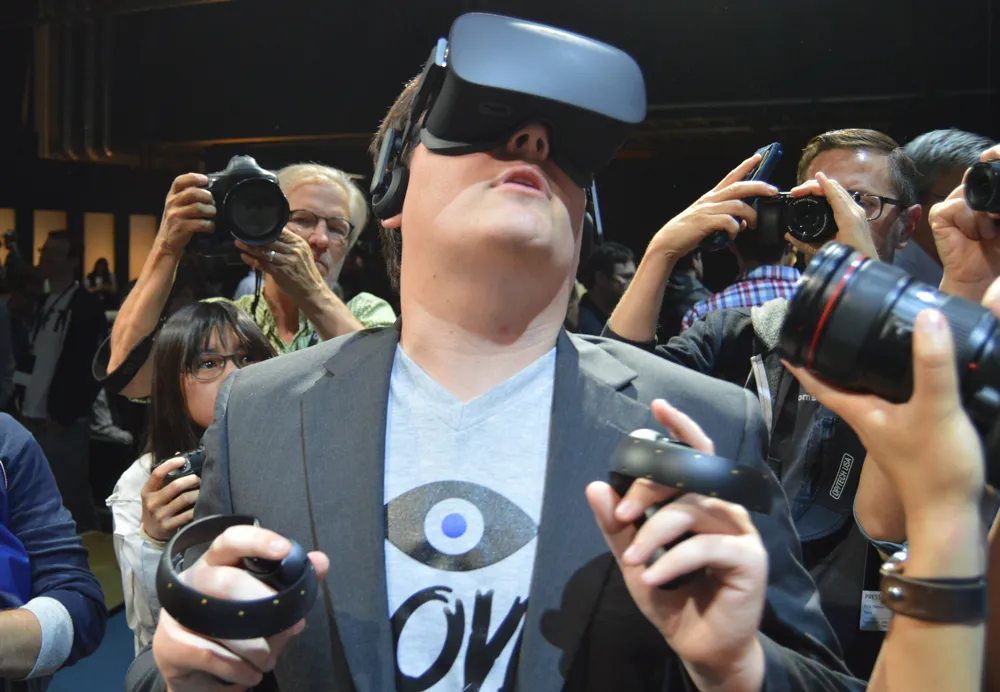Last September in the run up to one of the most divisive elections in the history of the United States, an article by The Daily Beast tied Oculus co-founder Palmer Luckey to an internet meme machine. Fallout from the piece essentially silenced Luckey in public, apart from a carefully worded apology, and erased him as the face of the VR industry. He departed Facebook at the end of March.
There is still much that is not understood about the whole debacle. As I originally wrote about the situation, The Daily Beast article was strangely sourced and made a series of connections tying Luckey to what seemed like a nefarious plot to influence the election through the use of the internet.
A new accounting of events by Blake Harris, author of Console Wars and an upcoming book about VR, questions the reporting of The Daily Beast writers Ben Collins and Gideon Resnick and deconstructs a timeline of rage born from the attention-grabbing headline and follow-on reports repeating its narrative. UploadVR published Harris’ timeline of events in an editorial over the weekend.
Harris wrote:
“I’m sure you remember that article (how could you not with a headline like that!) and I’m sure you recall some of the pieces that followed—like Ars Technica’s How your Oculus Rift is secretly funding Donald Trump’s racist meme wars or Boing Boing‘s Facebook near-billionaire Palmer Luckey secretly funding racist pro-Trump hate meme machine.”
Harris suggests the effect on Luckey’s reputation “would have been warranted…if what was described in those headlines had actually been true. But that’s just not the case. Not even close.” Harris suggests the organization Luckey financially supported, Nimble America, “was not responsible for creating or spreading any memes online. Nimble America’s goal was to take meme-like images [like the billboard above] and put them into the real world (via billboards, t-shirts and stickers). There is no evidence—nor, based on my research, do I see any reason to believe—that this organization promoted any sort of racist, sexist, misogynistic, anti-Semitic or white supremacist agenda. Neither is there any evidence of Nimble America engaging in any sort of trolling, harassing or “astroturfing.” Milo Yiannopoulos had no affiliation with Nimble America other than to endorse the cause and, in his capacity as a moderator of the The_Donald subreddit, verify that there was indeed a wealthy backer [Luckey] who had donated to the organization [a little less than $10,000].”
At its core, a fair amount of The Daily Beast’s narrative is built around whether or not Luckey posted under a Reddit pseudonym connected to some very unflattering posts — something Luckey denied but the Daily Beast reporters allege were owned by Luckey in emailed correspondence. It should also be noted that in Luckey’s public apology, he said he is “a libertarian who has publicly supported Ron Paul and Gary Johnson in the past, and I plan on voting for Gary in this election as well.” This is despite Luckey being spotted near a Trump rally earlier in the election cycle and reportedly donating $100,000 to his inauguration after he was elected.
All said, we still don’t know what really happened or why and Luckey’s not done himself any favors yet shedding light on the situation. I suspect he is bound by employment and severance agreements he signed at Facebook. As we move on, it is my hope that we learn what happened between when The Daily Beast began working on that story, when Luckey issued his apology — and ultimately what led to his departure from Facebook altogether many months later. Below are key questions for Palmer Luckey we hope get answered.
- Why did Luckey say he supported Gary Johnson in his public apology when he very likely supported and continues to support Donald Trump?
- If it was inaccurate, why didn’t Luckey more directly refute the reporting of The Daily Beast?
- Why is Luckey silent regarding his departure from Facebook?
These seem like obvious questions that some are hoping will simply be swept under the rug; we never heard back from Collins’ refute of Luckey’s apology, Facebook never mentioned the incident when it confirmed his departure, and Luckey himself has only made passing references to it since his social media revival. Unsurprisingly, it’s as if all parties are hoping distance will make people forget. Without these answers, though, it’s difficult to reach any conclusions about the past seven months in the life and career of one of VR’s most-recognized figures.






























